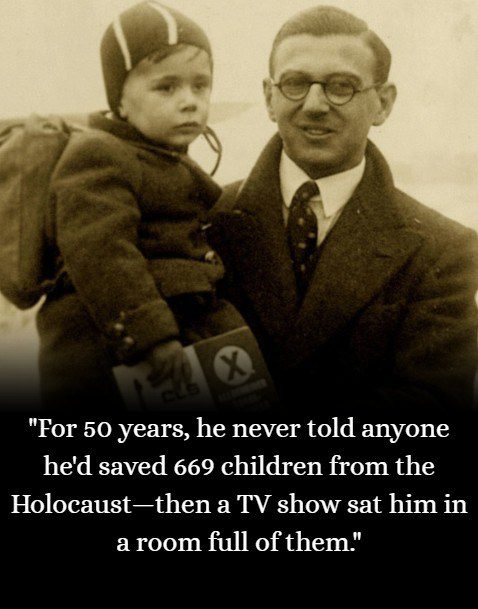The Hero Who Didn’t Seek Recognition: The Legacy of Nicholas Winton
History is often made by grand political figures and world leaders, but sometimes it is the quiet, humble individuals who leave the most lasting impact. One such man was Nicholas Winton, a British stockbroker who, without any formal authority or recognition, orchestrated the rescue of 669 children from Czechoslovakia in 1939, during the Holocaust. His actions, which he kept secret for over 50 years, eventually came to light in an incredibly emotional way, proving that even one person can change the lives of thousands.
A Call to Action: The Beginning of a Rescue Mission
In December 1938, most people were looking forward to the holiday season. Yet for Nicholas Winton, the season would take an unexpected turn. A close friend from Prague called him with an urgent request: “Come help. The situation is desperate.” The gravity of the situation could not be ignored. Winton, then just 29 years old, was planning to go skiing in Switzerland, but he immediately canceled his vacation and traveled to Czechoslovakia.
When he arrived, Winton saw the heart-wrenching reality of what the Jewish families in Czechoslovakia were facing. The Nazis had already annexed Austria and the Sudetenland, and Czechoslovakia was next. The violence of Kristallnacht, the night of broken glass, had left a deep scar on Jewish families, and many were fearful for their lives. Parents were desperate to escape the looming Holocaust, but they knew that, for the most part, escape was impossible for themselves. However, there was still hope for their children.
At this time, Britain had already agreed to accept Jewish children through the Kindertransport program. But this program focused mainly on rescuing children from Germany and Austria, leaving Czechoslovakia excluded. With no official channels or organizations to help, Winton took matters into his own hands. He decided to create his own Kindertransport operation to save as many children as possible.

Winton’s Children’s Section: A Personal Mission
Winton had no experience in rescue operations. He was a stockbroker, with no political connections or authority. He was simply an ordinary man who saw an urgent need and felt compelled to act. He didn’t wait for permission. He just acted.
Using his personal funds, Winton set to work creating “Winton’s Children’s Section.” From his hotel room in Prague and his flat in London, Winton forged documents, including false identities and travel papers. He navigated suffocating bureaucracies and convinced British families to host the children as refugees. The cost was £50 per child, an exorbitant amount during the Great Depression, but it was the price of saving a life.
Despite the many hurdles, Winton was unwavering in his resolve. He worked tirelessly, ensuring that every detail was arranged—from the forged documents to the transport logistics. Between March and August of 1939, Winton managed to arrange eight trains, each carrying groups of children from Prague to safety in Britain. Many of the children were infants, some were teenagers, and some would never see their parents again.
The children arrived in Britain with little more than a suitcase and a photograph. They were welcomed by British families, many of whom were strangers but offered a chance for these young refugees to survive the horrors that awaited their families back in Czechoslovakia.
Winton’s Secrecy: The Years That Followed
After the successful rescue operation, Winton returned to his ordinary life. He served in the Royal Air Force during the war, got married, and raised a family. He continued his career in stockbroking, but through all of it, he never once mentioned what he had done in Prague. He didn’t think it was extraordinary. He didn’t think it was worth talking about. He simply saw a problem and did what needed to be done. For Winton, the rescue of the 669 children was just another act of decency, something anyone would have done if they were in his shoes.
Over the next 50 years, Nicholas Winton remained silent about his actions. It wasn’t until 1988 that his story began to surface, and it was all thanks to his wife, Grete. While cleaning out their attic, Grete discovered an old scrapbook filled with meticulous records of the children Winton had rescued. The scrapbook contained names, photographs, and letters from the children’s parents, expressing their gratitude for saving their children’s lives. Moved by this discovery, Grete contacted Holocaust historians, and the story of Nicholas Winton began to unravel.
The discovery of the scrapbook eventually led to a BBC program, “That’s Life!” in 1988, where Winton’s story would be revealed to the world in one of the most emotional moments ever broadcast on television.

The Emotional Revelation: The Moment Winton Was Honored
Winton was invited to appear on the BBC show, but he was unaware of the reason for his invitation. At the taping of the show, he sat in the audience, elderly and unaware of what was to unfold. As the host, Esther Rantzen, began telling the audience about Winton’s actions, she then asked the question: “Is there anyone in the audience tonight who owes their life to Nicholas Winton?”
Winton’s response was one of shock and disbelief. The entire studio audience stood up, one by one, and applauded him. As the camera panned over the audience, Winton saw row after row of men and women—children he had rescued, now grown and grandparents themselves—standing and applauding him. The applause continued as Winton, overwhelmed with emotion, sat in silence, tears streaming down his face.
The broadcast of this powerful moment was watched by millions of people across the UK, and it was one of the most moving moments ever captured on television. It was an emotional revelation for Winton, who had never sought recognition for his actions. For the first time in his life, he was publicly honored for saving 669 children from the Holocaust.
A Legacy of Life: More Than 6,000 Lives Saved
Though Winton had kept his heroism a secret for decades, the revelation of his story sparked a worldwide recognition of his courage and selflessness. He was invited to reunions of the children he had saved. He attended ceremonies and met survivors, watching them bring their children and grandchildren into the world—a world they would never have had if not for his efforts.
Winton’s story didn’t end with the broadcast. He continued to meet with the survivors and their families, watching the legacy of his actions grow as the children he saved had families of their own. By the time of his passing, more than 6,000 people were alive thanks to Nicholas Winton.
In recognition of his extraordinary actions, Winton was knighted by Queen Elizabeth II. A statue of him now stands in Prague, at the train station where the children departed for their new lives in Britain.

The Power of One: How Winton’s Actions Changed the World
What made Nicholas Winton’s actions so powerful was not just the numbers of children he saved. It was the quiet, resolute determination of one man who chose to act when the world seemed unwilling to do so. He didn’t wait for permission, he didn’t look for fame, and he didn’t expect anything in return. He simply saw suffering, and he chose to do something about it.
Winton’s story proves a simple yet profound truth: you don’t need to be a world leader or a wealthy philanthropist to make a difference. All you need is the willingness to act when others won’t, and the courage to face challenges head-on. His story is a testament to the fact that ordinary people, when given the opportunity, can change the world.
Conclusion: Nicholas Winton’s Lasting Legacy
The legacy of Nicholas Winton is one of quiet heroism and humility. He was not driven by fame or recognition, but by an unwavering sense of responsibility. His story teaches us that sometimes, doing the right thing doesn’t require credentials or authority—it just requires the courage to stand up for what’s right.
Nicholas Winton lived to be 106 years old, and his legacy lives on through the generations of people whose lives he saved. He proved that one person can make an immeasurable impact on the world. Winton’s motto, “If something’s not impossible, there must be a way of doing it,” still resonates today, reminding us that we too can make a difference, no matter how small our actions may seem.


